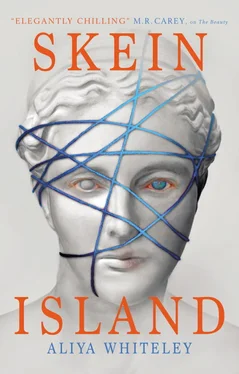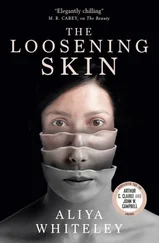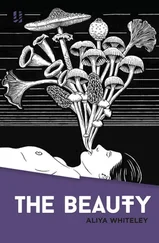She coughs. She’s awake.
We both lie there, being awake. Being breathed over.
‘Oh God,’ she says.
‘He’s just a ghost. An old man’s ghost,’ I tell her. ‘It’s really not a big deal. He visits me at dawn every day. He doesn’t mean any harm.’
He chuckles again, and is gone. The light of day is brighter, strengthening, but it cannot chase away his smoke. It’s still chewy.
I get up and pad over to the tiny bathroom. I close the door gently, then have a wee and brush my teeth. The toothpaste never quite takes all of the taste of cigars away. It has a habit of sitting right at the back of my throat.
When I emerge Katie is still in bed. ‘Come over here,’ she says. I sit beside her. She looks younger. Her eyes are very wide and her lips are pale. I keep watching them as she speaks; I find it difficult to follow what she’s saying, in a jumbled rush.
‘…understand how that could be because it’s been years and why would he be with you? Unless you’ve got some sort of other connection to him?’
‘What?’ The seagulls are raucous and it’s so early. I don’t want her to feel in control of this. Why is she talking about a connection? ‘It’s a spirit. A ghost. I know that’s a bit of a shock—’
‘It’s my grandfather,’ she says.
‘No, it’s not your grandfather—’
‘I knew him straight away. It’s him. It’s him. How do you know him? Tell me why he’s here. Is he here to speak to me? Has he told you about me? Is that why you came? You asked the staff to put us together? Did you—’
‘I think it’s time for breakfast,’ I tell her. I get up and walk to the kitchen.
‘Min,’ she calls as I hunt out a bowl for cereal, and switch on the kettle. ‘Min.’
Let her wait.
Let her fail to take him as her own.
* * *
We have a morning of activities ahead of us. Yoga and poetry and self-defence. Katie finds a space beside me for all of these classes. She seems weakened, in a way I can’t define. She overbalances while attempting Crescent Moon pose and puts out her hand, urgently, to me; I grasp it, and hold her as she rights herself.
During a group conversation about overcoming personal issues one of our number reveals that she has a degenerative disease. She doesn’t tell us what the disease is, and nobody asks. I notice nothing but a slight tremor in her voice as she talks. It could just as easily be down to nerves, if she’s not used to public speaking.
‘I wonder what bits of me will last the longest,’ she says, to our circle. ‘Not physically, so much, but mentally. No, not even that. Not my faculties but my personality. How it feels to be me. The way I pick at the sleeves of my jumpers until they start to unravel, and the way I hate the smell of salad cream, even at a distance. What if one day soon I lose the ability to smell salad cream and be repulsed by it? I won’t be me any more at that point.’
‘Your entire personality hinges on salad cream?’ says Katie, waspishly, perhaps even maliciously, and it triggers a reaction from the group that feels passionate and righteous. There’s a general condemnation of saying hurtful things for the sake of humour, and I find I want to say something too. Something loud. Shouting would suit me now, but what would I shout about? The only thing that comes to mind is an explanation of how hating salad cream might turn out to be the only element of a person that remains in their afterlife, and wouldn’t that be worse? The woman with the degenerative disease is frightened to lose herself entirely but I suspect she’d prefer that to becoming a vengeful spirit who roams around restaurants slapping sachets of salad cream out of the hands of unsuspecting diners.
They’re all shouting about the same thing, which is the need to listen to each other, and it takes them a while to realise it. I sit in my own circle of silence, and observe. The moderator restores order and the session goes on. People list what they would most hate to lose about themselves and when it comes to my turn I say, ‘My sense of humour.’ Let me remain as a long mouthless laugh that hangs in a room. I can see the appeal of that destiny, now.
Next it’s Katie’s turn. She says, ‘My personality.’
‘You can’t lose that,’ says someone. ‘Nobody can ever take that away.’
‘How naïve of you,’ says Katie, triggering another intense conversation. She doesn’t speak in the group session again.
* * *
She only wants to talk about the ghost, and all I want is to refuse her. Whenever she tries to raise the issue I put another task between us and the conversation. A swim. A shower. Dinner. And now, at the end of the day with the meal all eaten, I demand to spend half an hour on my declaration.
Katie sits across from me at the kitchen table and puts down her own words. She writes fast, without pause. She has a lot to say.
I don’t try to pick up where I left off. I don’t think this whole thing will find any order, chronologically or otherwise.
I feel so badly for that woman with the wasting disease. I’m learning from her. She taught me something. But who wants to be there just to be an inspiration? We went around the group and said our names and I registered hers for a second at most, then forgot it. Her pain is nothing more than an impetus for me to have my own thoughts. She’s a ghost too, I suppose. We’re all ghosts to each other. We breathe out smoke, and others take it in. But we’re no more than the smoke .
I must be more .
Those are all the words that will come to me. I put down my pen and wait for Katie to stop writing. She levels a calm stare at me, and I meet it.
‘All right,’ I say. ‘Tell me about your grandfather.’
She reads it straight off the page in front of her and I try to take it in and hold it.
The Declaration of Katharine Johnston
I’m forty-seven years old and I have never been close to anyone if I can help it. I mean that in both the emotional and the physical sense, although I’ve had times when I’ve been unable to keep my barriers in place. I feel disappointment in myself when these rare events occur. I can’t explain why, except to say closeness appals me. It feels like a way of avoiding certain realities. We’re born alone, we die alone; that kind of thing. I hate the things people do to evade this inevitability, like taking a scenic diversion to a place that you already know is a shithole .
I think my attitude to life is probably very similar to my grandfather’s way of seeing the world. Let me give you an example:
My grandfather got married for a bet. It wasn’t even a bet he made .
He couldn’t have cared less about the idea of human companionship as a necessity for a fulfilled life. Nothing mattered to him but being outdoors, alone, miles from anyone . When he was young he would go walking for months, across the breadth of Yorkshire. He would eat what he could find, beg or steal. He would only return when his shoes had worn through .
At least, that’s what my father told me. My father, the social being and needy romantic .
On one of these occasions of return my great uncle, one year younger than his brother, told my grandfather over the dinner table of a conversation he’d had during a night out at the pub in the village. A bet had been mooted that my grandfather would never get married – but who would be stupid enough to take such a bet? Everyone knew he would never tie the knot. He’d never even so much as looked at a girl. Eventually my great uncle had reluctantly taken the bet, out of a sense of familial duty. After relating this story he had, apparently, shrugged and said, ‘That’s good money wasted, unless you’re willing to pay me back for it.’
Читать дальше












